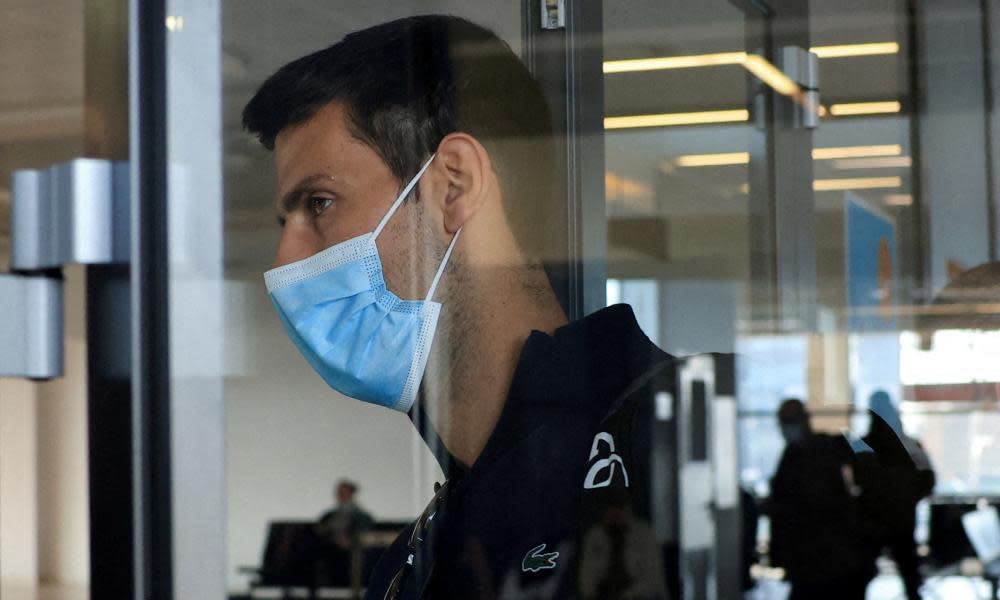‘Plainly open’ to Australian immigration minister to conclude Novak Djokovic was anti-vaccination: judges

Novak Djokovic could be deported from Australia because it was “plainly open” to the immigration minister to conclude the world No 1 tennis star was opposed to vaccination against Covid, the full federal court has said.
Chief justice James Allsop on Thursday delivered the court’s reasons for rejecting Djokovic’s challenge to his visa cancellation. The court found it was reasonable for the minister to be concerned his presence “may encourage rallies and protests that may lead to heightened community transmission”.
The decision resulted in Djokovic’s deportation just a day before the scheduled start of his Australian Open title defence.
The Australian immigration minister, Alex Hawke, had cancelled Djokovic’s visa on the basis his presence in Australia might risk “civil unrest” as he was a “talisman of anti-vaccination sentiment”.
Related: Djokovic has 80% stake in biotech firm developing Covid drug
Djokovic’s lawyers disputed claims the tennis star was an anti-vaxxer, arguing that was based on one statement in April 2020 “well before Covid vaccines were available” and that Hawke had failed to ask the tennis player his views.
The judges noted that in order to deport Djokovic the minister only had to be “satisfied that his presence is, or may be, or would, or might be … a risk”. To win, Djokovic would have had to have shown the minister could not have been satisfied “logically or rationally on the available material”.
The judges concluded that it was open to Hawke to find that “Djokovic had a stance that was well-known on vaccination and that he was opposed to it” on the basis of the April 2020 news article.
In that interview, Djokovic reportedly said he was “opposed to vaccination” although he had qualified this by saying that he was “no expert” and “would keep an open mind”.
“Further, there was no issue that Mr Djokovic was not, by January 2022, vaccinated,” the judge said in their reasons, meaning it was “plainly open” for Hawke to infer “he was opposed to vaccination or did not wish to be”.
The full court noted that Hawke was satisfied that Djokovic’s stance could encourage anti-vaccination groups and found the evidence supported “an affinity of these groups with his views”.
“It was not irrational for the minister to be concerned that the asserted support of some anti-vaccination groups for Mr Djokovic’s apparent position on vaccination may encourage rallies and protests that may lead to heightened community transmission.”
They also accepted that people “simply uncertain or wavering as to whether they will be vaccinated” might be influenced because “an iconic world tennis star may influence people of all ages, young or old, but perhaps especially the young and the impressionable, to emulate him”.
Related: Tennis Australia board breaks silence to ‘commend’ Craig Tiley following Novak Djokovic saga
The judges noted that there was evidence “Djokovic had recently disregarded reasonable public health measures overseas by attending activities unmasked while Covid positive to his knowledge”.
Djokovic had admitted to attending events after testing positive to Covid-19 on 16 December, including knowingly attending a media interview and photoshoot on 18 December after he had been notified of the results.
Djokovic’s lawyers argued Hawke failed to consider the impact on anti-vaccination sentiment if he were deported, but the judges concluded it was not necessary for him to do so. They also found Hawke “was aware of any number of different consequences that might ensue if the visa were cancelled” and had not ignored adverse consequences.
Djokovic was taken into immigration detention after his visa was cancelled on 6 January, before it was restored by the federal circuit court on 10 January.
On Thursday, The Sun reported that Djokovic was considering suing the Australian government over his detention, arguing it amounted to ill-treatment.
Djokovic’s mother claims he was “subjected to torture, to harassment”, an apparent reference to the conditions at the Park hotel in Melbourne where he was kept with refugees and asylum seekers, who had reported finding maggots in their food in December.
Hawke exercised a personal power to re-cancel Djokovic’s visa sparking the federal court case, which upheld the cancellation and resulted in his deportation the evening before the start of the Australian Open on Monday.

 Yahoo Movies
Yahoo Movies 
